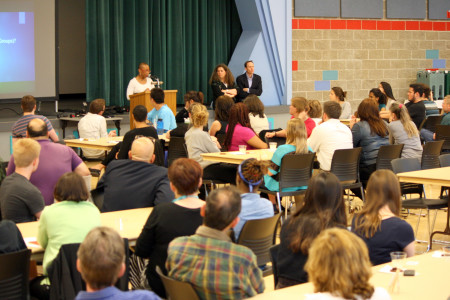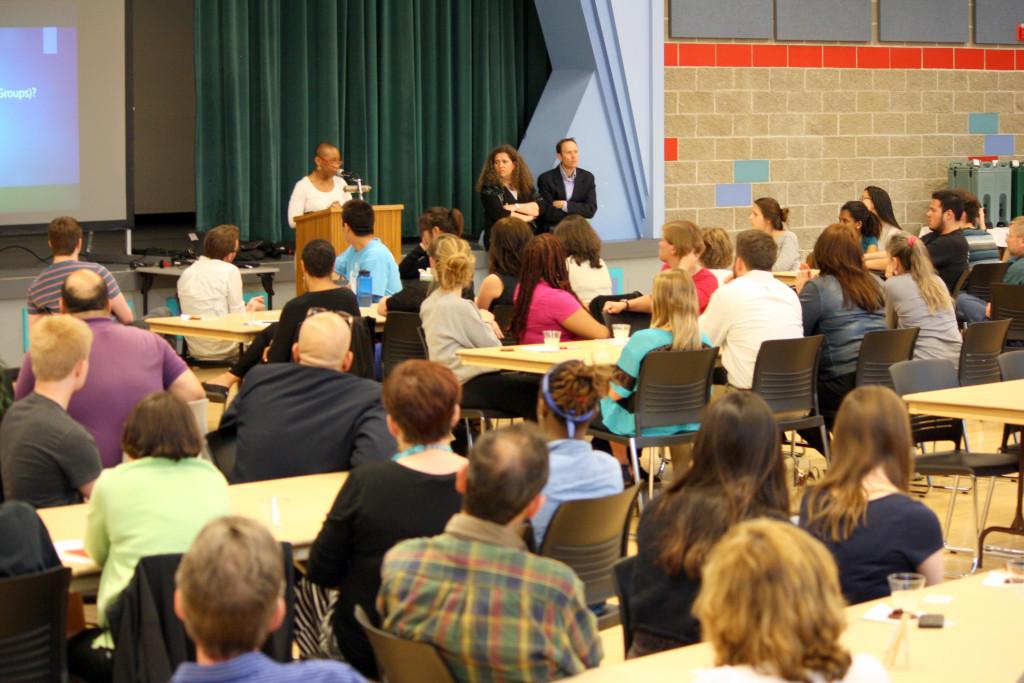On Wednesday, April 1, Grinnell College ombudsperson Chinyere Ukabiala gave a talk titled, “Finding Ways Forward” in Harris Center, which was delivered in response to recent issues concerning anonymous racist remarks on the social media app Yik Yak. The event was organized by Dean and Vice President of Academic Affairs Mike Latham, Associate Vice President of Student Affairs Andrea Conner, Ukabiala and Associate Dean to the College Maria Tapias and sponsored by the Offices of the Dean, Student Affairs, the Ombudperson, Diversity and Inclusion, and the Office of Intercultural Engagement and Leadership to reflect on the effects of these events on the social life in Grinnell.
According to Conner, Ukabiala’s talk was designated to create a space for bringing together multiple pockets of dialogue around campus.
“The intent of the talk was to give a more public open space for the smaller dialogues that have been happening within pockets of friends and other campus organizations and for the community to demonstrate that we wanted to bring these issues to a larger scale,” Conner noted.
Before the event began, students were assigned different numbers at the door before entering which grouped them to different tables with at least one faculty member. After they were seated, Dean Latham addressed the audience and delivered a PowerPoint presentation that explained in depth the issues that the College has had in recent months with Yik Yak, and the influence that the app has had on students and organizations on campus.
Latham began by explaining the purpose for his speech.
“I do this with some reluctance … but I honestly believe that if we don’t bring this out then we cannot identify the problem,” Latham said. After showing examples of some posts on Yik Yak (known as Yaks) and blacking out Yaks that involved individual names, Ukabiala discussed her views on respectful conversation on the app.
Ukabiala stated that Grinnell students needed to have respectful conversation about these subjects because “actions of prejudice and bigotry can have very lasting effects.” She then outlined some ground rules for the group discussions at individual tables, and then instructed those seated at the tables to look at copies of questions placed on their table beforehand and discuss them within their groups.
The questions covered inquiries regarding how students felt about what happened, why they think it happened, how students feel they should act as support groups and how the issues within Grinnell should be resolved. Faculty members at each table were in charge of mediating the conversation and writing down answers to questions about how to deal with racism on campus and how they felt this issue should be addressed.
Student answers are a “vital and valued part of this community,” Tapias said.

During the group discussions, some students (who are identified anonymously given the safe space nature of these discussions) said that they felt that Grinnell did not have the knowledge nor proper atmosphere in classrooms and social environments to discuss these topics. For example, one student stated, “I’m African American. This issue scares me because I now am aware there are those who do not want me here because of who I am and I do not even know who they are.”
Once small group discussions had concluded, attendees were called on to discuss their answers among the crowd as a whole. Some commented on their concerns that students were too sensitive or insensitive while others stated the need for students to learn to ask and educate themselves more about these issues. As the meeting adjourned, students were still intent on discussing their findings but many felt that the session was helpful.
Another student said that he felt that the session was, “beneficial and needed to happen. Admitting this happened and discussing it is an important first step.”
Dean Latham agreed, stating that he believed although this was a first step, it was a good one towards creating a more open dialogue.
“This was a good first step that gave students the opportunity to speak in an open forum where we as a community need to go from here,” Latham said. He added that there will be upcoming meetings to discuss the progress of these talks and discussions later in April.
























































